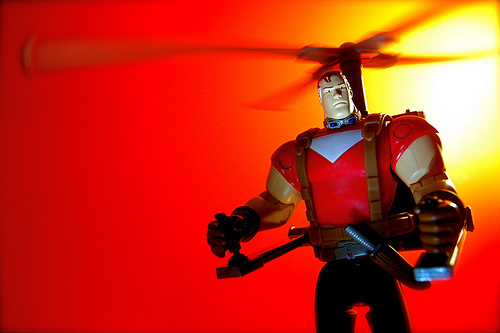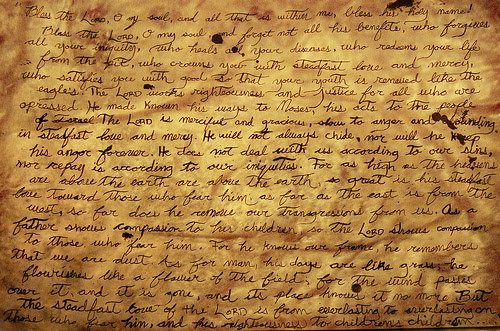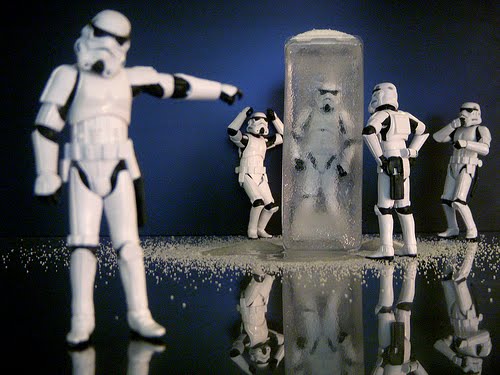David Mamet sent a memo to the writers of The Unit in which he tells them how to craft a dramatic story, one which will keep an audience's attention riveted.
I've included Mr. Mamet's original memo at the end of this article (it's from: David Mamet's Master Class Memo to the Writers of The Unit), but I've summarized his points.
What Is Drama?
Drama is:
The quest of the hero to overcome those things which prevent him from achieving a specific, acute, goal.The hero must have a simple, straightforward, pressing need which impels him or her to show up in the scene.
Every scene must be dramatic. It must start because the hero has a problem and it must culminate with the hero finding him or herself either thwarted or educated that another way exists.
The hero's need is what the scene is about. It is the hero's attempt to get this need met which will lead, at the end of the scene, to failure or to a third way. It is this failure (or change of direction) that will propel us into the next scene.
The Job Of The Dramatist
The job of the dramatist is to make the audience wonder what happens next. It is not to look at past action and explain what just happened nor is it to suggest what will happen next.
The Anatomy Of A Great Scene
If you can answer all three questions, below, then your scene is dramatic. If you can't, you're just giving your reader information.
1) Who wants what?If you can't say "Yes!" to both of the following, that scene is either superfluous or incorrectly written:
2) What happens if they don't get it?
3) What now?
1) The scene advances the plot.If a scene is superfluous, throw it out. If it's incorrectly written, rewrite it.
2) The scene is dramatic. That is, in it the hero has a pressing need which impels him to show up in the scene and, at the end, the hero is either thwarted in his goal OR finds that another way exists to achieve it.
Signs That Your Script Is In Trouble
- Your script is in trouble if it has two characters talking about a third character not present.I think things might be slightly different when we talk about writing as opposed to screenwriting since screenwriting is a VISUAL medium. There you really can show not tell. Also you can easily cut away and show an event happening that no character is seeing, but this is more difficult to do when writing a story.
- Your script is in trouble if it has one character saying to another, "As you know ..."
Kill Your Darlings
I'd like to end with a quotation, one that I believe applies to both story writing and screenwriting:
This is a new skill. No one does it naturally. You can train yourselves to do it, but you need to start.Great advice regardless of medium.
I close with this one thought: look at the scene and ask yourself "Is it dramatic? Is it essential? Does it advance the plot?"
Answer truthfully.
If the answer is "No" write it again or throw it out.
Best of luck with your writing today. I'm just over 14,000 words for NaNoWriMo.
Other articles you might like:
- How To Earn A Living As A Self-Published Writer
- Using Pinch Points To Increase Narrative Drive
- Chuck Wendig And The Battle Song Of The Storyteller
- How To Write 10,000 Words A Day
Photo credit: "Strong Revolutionary Lift" by JD Hancock under Creative Commons Attribution 2.0.
# # #
David Mamet's Memo To The Writers Of The Unit:
TO THE WRITERS OF THE UNIT
GREETINGS.
AS WE LEARN HOW TO WRITE THIS SHOW, A RECURRING PROBLEM BECOMES CLEAR.
THE PROBLEM IS THIS: TO DIFFERENTIATE BETWEEN DRAMA AND NON-DRAMA. LET ME BREAK-IT-DOWN-NOW.
EVERYONE IN CREATION IS SCREAMING AT US TO MAKE THE SHOW CLEAR. WE ARE TASKED WITH, IT SEEMS, CRAMMING A SHITLOAD OF INFORMATION INTO A LITTLE BIT OF TIME.
OUR FRIENDS. THE PENGUINS, THINK THAT WE, THEREFORE, ARE EMPLOYED TO COMMUNICATE INFORMATION -- AND, SO, AT TIMES, IT SEEMS TO US.
BUT NOTE:THE AUDIENCE WILL NOT TUNE IN TO WATCH INFORMATION. YOU WOULDN'T, I WOULDN'T. NO ONE WOULD OR WILL. THE AUDIENCE WILL ONLY TUNE IN AND STAY TUNED TO WATCH DRAMA.
QUESTION:WHAT IS DRAMA? DRAMA, AGAIN, IS THE QUEST OF THE HERO TO OVERCOME THOSE THINGS WHICH PREVENT HIM FROM ACHIEVING A SPECIFIC, ACUTE GOAL.
SO: WE, THE WRITERS, MUST ASK OURSELVES OF EVERY SCENE THESE THREE QUESTIONS.
1) WHO WANTS WHAT?
2) WHAT HAPPENS IF HER DON'T GET IT?
3) WHY NOW?
THE ANSWERS TO THESE QUESTIONS ARE LITMUS PAPER. APPLY THEM, AND THEIR ANSWER WILL TELL YOU IF THE SCENE IS DRAMATIC OR NOT.
IF THE SCENE IS NOT DRAMATICALLY WRITTEN, IT WILL NOT BE DRAMATICALLY ACTED.
THERE IS NO MAGIC FAIRY DUST WHICH WILL MAKE A BORING, USELESS, REDUNDANT, OR MERELY INFORMATIVE SCENE AFTER IT LEAVES YOUR TYPEWRITER. YOU THE WRITERS, ARE IN CHARGE OF MAKING SURE EVERY SCENE IS DRAMATIC.
THIS MEANS ALL THE "LITTLE" EXPOSITIONAL SCENES OF TWO PEOPLE TALKING ABOUT A THIRD. THIS BUSHWAH (AND WE ALL TEND TO WRITE IT ON THE FIRST DRAFT) IS LESS THAN USELESS, SHOULD IT FINALLY, GOD FORBID, GET FILMED.
IF THE SCENE BORES YOU WHEN YOU READ IT, REST ASSURED IT WILL BORE THE ACTORS, AND WILL, THEN, BORE THE AUDIENCE, AND WE'RE ALL GOING TO BE BACK IN THE BREADLINE.
SOMEONE HAS TO MAKE THE SCENE DRAMATIC. IT IS NOT THE ACTORS JOB (THE ACTORS JOB IS TO BE TRUTHFUL). IT IS NOT THE DIRECTORS JOB. HIS OR HER JOB IS TO FILM IT STRAIGHTFORWARDLY AND REMIND THE ACTORS TO TALK FAST. IT IS YOUR JOB.
EVERY SCENE MUST BE DRAMATIC. THAT MEANS: THE MAIN CHARACTER MUST HAVE A SIMPLE, STRAIGHTFORWARD, PRESSING NEED WHICH IMPELS HIM OR HER TO SHOW UP IN THE SCENE.
THIS NEED IS WHY THEY CAME. IT IS WHAT THE SCENE IS ABOUT. THEIR ATTEMPT TO GET THIS NEED MET WILL LEAD, AT THE END OF THE SCENE,TO FAILURE - THIS IS HOW THE SCENE IS OVER. IT, THIS FAILURE, WILL, THEN, OF NECESSITY, PROPEL US INTO THE NEXT SCENE.
ALL THESE ATTEMPTS, TAKEN TOGETHER, WILL, OVER THE COURSE OF THE EPISODE, CONSTITUTE THE PLOT.
ANY SCENE, THUS, WHICH DOES NOT BOTH ADVANCE THE PLOT, AND STANDALONE (THAT IS, DRAMATICALLY, BY ITSELF, ON ITS OWN MERITS) IS EITHER SUPERFLUOUS, OR INCORRECTLY WRITTEN.
YES BUT YES BUT YES BUT, YOU SAY: WHAT ABOUT THE NECESSITY OF WRITING IN ALL THAT "INFORMATION?"
AND I RESPOND "FIGURE IT OUT" ANY DICKHEAD WITH A BLUESUIT CAN BE (AND IS) TAUGHT TO SAY "MAKE IT CLEARER", AND "I WANT TO KNOW MORE ABOUT HIM".
WHEN YOU'VE MADE IT SO CLEAR THAT EVEN THIS BLUESUITED PENGUIN IS HAPPY, BOTH YOU AND HE OR SHE WILL BE OUT OF A JOB.
THE JOB OF THE DRAMATIST IS TO MAKE THE AUDIENCE WONDER WHAT HAPPENS NEXT. NOT TO EXPLAIN TO THEM WHAT JUST HAPPENED, OR TO*SUGGEST* TO THEM WHAT HAPPENS NEXT.
ANY DICKHEAD, AS ABOVE, CAN WRITE, "BUT, JIM, IF WE DON'T ASSASSINATE THE PRIME MINISTER IN THE NEXT SCENE, ALL EUROPE WILL BE ENGULFED IN FLAME"
WE ARE NOT GETTING PAID TO REALIZE THAT THE AUDIENCE NEEDS THIS INFORMATION TO UNDERSTAND THE NEXT SCENE, BUT TO FIGURE OUT HOW TO WRITE THE SCENE BEFORE US SUCH THAT THE AUDIENCE WILL BE INTERESTED IN WHAT HAPPENS NEXT.
YES BUT, YES BUT YES BUT YOU REITERATE.
AND I RESPOND FIGURE IT OUT.
HOW DOES ONE STRIKE THE BALANCE BETWEEN WITHHOLDING AND VOUCHSAFING INFORMATION? THAT IS THE ESSENTIAL TASK OF THE DRAMATIST. AND THE ABILITY TO DO THAT IS WHAT SEPARATES YOU FROM THE LESSER SPECIES IN THEIR BLUE SUITS.
FIGURE IT OUT.
START, EVERY TIME, WITH THIS INVIOLABLE RULE: THE SCENE MUST BE DRAMATIC. it must start because the hero HAS A PROBLEM, AND IT MUST CULMINATE WITH THE HERO FINDING HIM OR HERSELF EITHER THWARTED OR EDUCATED THAT ANOTHER WAY EXISTS.
LOOK AT YOUR LOG LINES. ANY LOGLINE READING "BOB AND SUE DISCUSS..." IS NOT DESCRIBING A DRAMATIC SCENE.
PLEASE NOTE THAT OUR OUTLINES ARE, GENERALLY, SPECTACULAR. THE DRAMA FLOWS OUT BETWEEN THE OUTLINE AND THE FIRST DRAFT.
THINK LIKE A FILMMAKER RATHER THAN A FUNCTIONARY, BECAUSE, IN TRUTH, YOU ARE MAKING THE FILM. WHAT YOU WRITE, THEY WILL SHOOT.
HERE ARE THE DANGER SIGNALS. ANY TIME TWO CHARACTERS ARE TALKING ABOUT A THIRD, THE SCENE IS A CROCK OF SHIT.
ANY TIME ANY CHARACTER IS SAYING TO ANOTHER "AS YOU KNOW", THAT IS, TELLING ANOTHER CHARACTER WHAT YOU, THE WRITER, NEED THE AUDIENCE TO KNOW, THE SCENE IS A CROCK OF SHIT.
DO NOT WRITE A CROCK OF SHIT. WRITE A RIPPING THREE, FOUR, SEVEN MINUTE SCENE WHICH MOVES THE STORY ALONG, AND YOU CAN, VERY SOON, BUY A HOUSE IN BEL AIR AND HIRE SOMEONE TO LIVE THERE FOR YOU.
REMEMBER YOU ARE WRITING FOR A VISUAL MEDIUM. MOST TELEVISION WRITING, OURS INCLUDED, SOUNDS LIKE RADIO. THE CAMERA CAN DO THE EXPLAINING FOR YOU. LET IT. WHAT ARE THE CHARACTERS DOING -*LITERALLY*. WHAT ARE THEY HANDLING, WHAT ARE THEY READING. WHAT ARE THEY WATCHING ON TELEVISION, WHAT ARE THEY SEEING.
IF YOU PRETEND THE CHARACTERS CANT SPEAK, AND WRITE A SILENT MOVIE, YOU WILL BE WRITING GREAT DRAMA.
IF YOU DEPRIVE YOURSELF OF THE CRUTCH OF NARRATION, EXPOSITION,INDEED, OF SPEECH. YOU WILL BE FORGED TO WORK IN A NEW MEDIUM - TELLING THE STORY IN PICTURES (ALSO KNOWN AS SCREENWRITING)
THIS IS A NEW SKILL. NO ONE DOES IT NATURALLY. YOU CAN TRAIN YOURSELVES TO DO IT, BUT YOU NEED TO START.
I CLOSE WITH THE ONE THOUGHT: LOOK AT THE SCENE AND ASK YOURSELF "IS IT DRAMATIC? IS IT ESSENTIAL? DOES IT ADVANCE THE PLOT?
ANSWER TRUTHFULLY.
IF THE ANSWER IS "NO" WRITE IT AGAIN OR THROW IT OUT. IF YOU'VE GOT ANY QUESTIONS, CALL ME UP.
LOVE, DAVE MAMET
SANTA MONICA 19 OCTO 05
(IT IS NOT YOUR RESPONSIBILITY TO KNOW THE ANSWERS, BUT IT IS YOUR, AND MY, RESPONSIBILITY TO KNOW AND TO ASK THE RIGHT Questions OVER AND OVER. UNTIL IT BECOMES SECOND NATURE. I BELIEVE THEY ARE LISTED ABOVE.)











